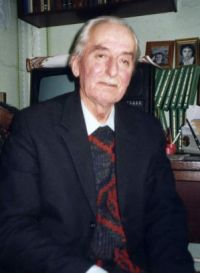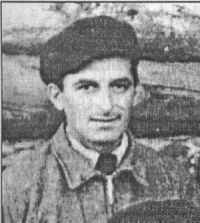Born August 20, 1931, in the village of Piadyky, now in the Kolomyia raion of Ivano-Frankivsk oblast.
Leader of the United Party for the Liberation of Ukraine (UPLU).
His father, Vasyl Yosypovych Hermaniuk (1900-1951), and his mother, Hafia Yosypivna Paliy (1905, died in the 1980s), were farmers.
H. completed 7 grades at the Piadyky secondary school and enrolled in the Chernivtsi Industrial Technical College. After graduating, he requested an assignment to Ivano-Frankivsk to look after his younger brother and his mother, who had suffered a mental breakdown due to hardship. He studied extramurally at the Lviv Polytechnic Institute.
As early as 1948, H. shared his idea of creating an organization to fight for Ukraine’s independence with his cousin, Bohdan Rubych, who was home on leave from the Soviet Army. Rubych joined an underground UPA organization and never returned to service. He advised H. to maintain strict conspiracy and use pseudonyms (H. took the name “Khmel”). By then, H. was already in contact with the OUN district referent, “Bystryi.”
H. found like-minded individuals among his fellow villagers: his classmate, worker Myroslav PLOSHCHAK (“Bilyi,” b. 1931), his brother, a physical education and Ukrainian language teacher, Vasyl PLOSHCHAK (“Stepan,” b. 1929), workers R. Arsak and M. Kostiuk, Mariika Zamulynska, and others.
After the armed struggle of the UPA ceased, the youth organization began to operate independently under the name “United Party for the Liberation of Ukraine” (UPLU). Its founding meeting took place in the spring of 1955 on the banks of the Prut River near Kolomyia. Here, the charter, program, and name proposed by B. TYMKIV and edited by I. STRUTYNSKYI and V. PLOSHCHAK were adopted. The organization aimed to unite all strata of the population in the struggle for Ukraine's independence, citing the USSR Constitution, which granted each republic the right to secede from the union. Its goal was to establish contact with like-minded people in other republics.
Candidates were discussed in closed meetings and then invited to join the organization. The oath was sealed with a signature in blood. They met in Piadyky, Vyhoda, Dolyna, and Kolomyia, posting a lookout (guard) during meetings and maintaining strict secrecy, so there were no failures or surveillance noticed. However, two former political prisoners accepted into the UPLU, Mykhailo Cherevko and Myroslav Maslovskyi, informed the KGB that the organization's archive was kept by its secretary, Petro Haiovyi.
H. was arrested on December 4, 1958, in Ivano-Frankivsk. Unaware of the fate of the other members and fearing he would not withstand torture, H. planned to commit suicide to avoid betraying his comrades. But in the prison bathhouse, a seemingly accidental meeting was arranged with Yarema TKACHUK, who told him about the arrests. H. then decided to take responsibility for authoring the charter, program, and oath, which had been confiscated from him.
Before the investigation concluded, he was interrogated by 12 KGB agents.
On March 10, 1959, in a closed session of the Ivano-Frankivsk Regional Court, the prosecutor demanded the death penalty for H., Y. TKACHUK, M. PLOSHCHAK, B. TYMKIV, and I. STRUTYNSKYI, who had also claimed authorship of the documents. The court, however, sentenced them under Article 54, points 1A and 11 (“anti-Soviet nationalist activity”) to 10 years of imprisonment in strict-regime labor camps each. Mykola YURCHYK and Ivan KONEVYCH received 7 years each, and Vasyl PLOSHCHAK received 2 years. His friends unanimously shielded V. PLOSHCHAK, claiming he was unaware of the organization's existence.
A total of 28 individuals were involved in the case. Roman Arsak, Mykhailo Kozak, Petro Haiovyi, and Dmytro Nazaruk appeared as witnesses. In total, the organization had up to fifty members across the oblast.
H. served his sentence in Ozerlag, a punitive camp in the Irkutsk oblast. There he met Myroslav SYMCHYCH, Father Zinoviy KARAS, Petro Duzhyi, and Volodymyr Horbovyi. Later, he was transferred to the Tayshet camps (No. 11, 7, 1). The regime tightened, rations were reduced, commercial canteens were abolished, and correspondence was limited. Despite this, there were amateur art activities in the camps, and religious and national holidays were celebrated. H. finished his sentence in camp ZhKh-385/17 in Mordovia, where he sewed work gloves. There he was with Hryts and Omelian Pryshliak, Yevhen Poliovyi, Mykhailo SOROKA, Colonel Levkovych, and Danylo SHUMUK.
Two years before the end of his term, H., along with Ihor KICHAK, was brought to Ivano-Frankivsk for talks. They were offered visits and packages but refused them, as cooperation with the KGB was demanded in return.
He was released at the end of 1968 and returned to Piadyky, where he had to care for his ailing mother. He was harassed with summonses to the KGB. He worked at a brick factory in Pechenizhyn, as a construction foreman at a service center in Kolomyia, and traveled on contracts for construction work in the Mykolaiv region.
In 1989, he headed the Kolomyia organization of the UHU, and later the URP. He is a member of the All-Ukrainian Society of Political Prisoners and the Repressed.
He is now retired and lives in the city of Kolomyia, Ivano-Frankivsk oblast.
Bibliography:
Ihor Mardarovych. “Holos pamiati” (Voice of Memory). Visnyk Kolomyi. No. 63 (457). November 10, 1994.
Ihor Mardarovych. “Piadytska orhanizatsiia OPVU” (The Piadyky UPLU Organization). Visnyk Kolomyi. No. 77 (471). December 28, 1994.
Anatoliy Rusnachenko. Natsionalno-vyzvolnyi rukh v Ukraini. Seredyna 1950-kh – pochatok 1990-kh rokiv (The National Liberation Movement in Ukraine: Mid-1950s to Early 1990s). Kyiv: Oleny Telihy Publishing, 1998. P. 96. (Here Hermaniuk is mistakenly called Harmatiuk, and Ploshchak is called Pliushchyk).
Yarema Tkachuk. Burevii. Knyha pamiati (Stormwinds. A Book of Memory). Lviv: SPOLOM Publishing, 2004. 368 pp.
KHPG Archives. Interview with B. Hermaniuk, February 9, 2000. https://museum.khpg.org/1263393069
Mizhnarodnyi biohrafichnyi slovnyk dysydentiv krain Tsentralnoi ta Skhidnoi Yevropy i kolyshnoho SRSR (International Biographical Dictionary of Dissidents in Central and Eastern Europe and the Former USSR). Vol. 1. Ukraine. Part 1. Kharkiv: Kharkiv Human Rights Protection Group; “Prava Liudyny,” 2006. Pp. 205–207. https://museum.khpg.org/1121097461;
Rukh oporu v Ukraini: 1960 – 1990 (The Resistance Movement in Ukraine: 1960 – 1990).
Entsyklopedychnyi dovidnyk (An Encyclopedic Guide). Preface by Osyp Zinkevych, Oles Obertas. Kyiv: Smoloskyp, 2010. Pp. 137–138; 2nd ed.: 2012. Pp. 152–153.
Vasyl Ovsienko, Kharkiv Human Rights Protection Group. March 13, 2005. Last read on August 5, 2016. Photo by V. Ovsienko, February 9, 2000.

